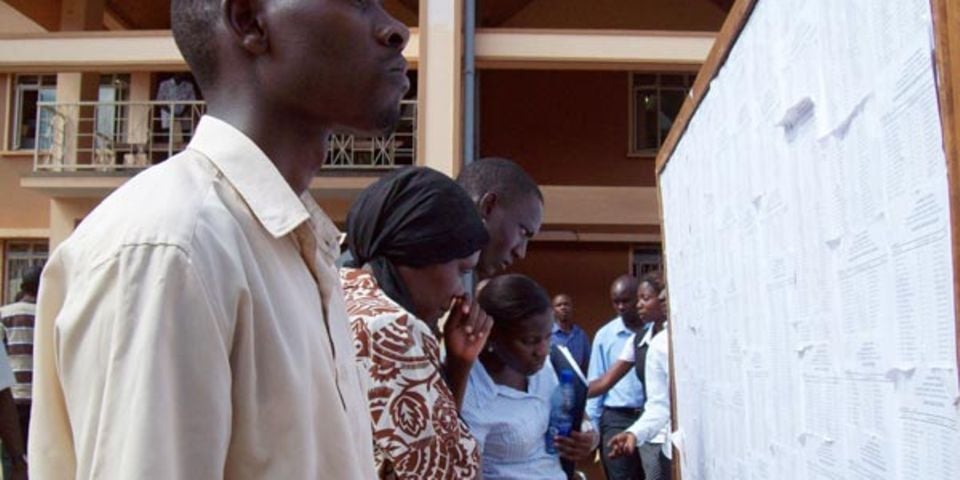Prime
Expired degree courses? 6 key questions, answers

Students check for their names on the Makerere University government sponsorship list at Senate building in 2017. PHOTO/FILE
What you need to know:
- The country was yesterday rattled by reports including by this newspaper that most of the universities and tertiary institutions in Uganda were teaching hundreds of “expired” degree and diploma programmes, according to the higher education sector regulator. In this explainer, Managing Editor Tabu Butagira offers a simplified guide to the intricate issues, answers the lingering questions and details why alarm might be louder than risk at hand as expired courses mean different things to different institutions.
1- What is the problem?
Some foreign institutions, among them the University of Bristol in the United Kingdom, notified applicants who completed their first degrees in differentdisciplines at various public and private universities in Uganda that they were ineligible for admission for graduate studies. Reason? That their qualifications were in courses listed by the National Council for Higher Education (NCHE), the higher education statutory regulator, as “expired”. An expired programme is one not accredited or authorised to be taught. The number of programmes listed by NCHE on its website as “expired” grosses 2,000.
2- How do academic programmes expire?
The establishment of universities and tertiary institutions in Uganda is guided by the Universities and Other Tertiary Institutions Act, 2001. NCHE oversees implementation of the law. The regulator’s mandate, among others, includes accrediting institutions of higher learning and the programmes they teach. The law requires universities, with approval by NCHE, to review academic programmes every five years for undergraduate and master’s degree courses and 10 years for doctoral programmes. Academic programmes expire when not re-accredited within legal timeframe, when scrapped or merged or split by the institution offering it or when the institution changes the name (and design).
3- Why do authorised academic programmes again require to be re-accredited?
The NCHE accredits programmes to guarantee quality assurance. The decision is based on staffing, programme component and its teaching and learning outcomes relevant to intended academic award, conformity with existing or new legislations, availability of infrastructure and relevance of discipline to the job market and country. These variables keep changing; so, academic programmes have to be dynamic and adapt. For instance, academic staff may be depleted by brain drain, death, retirement or further training, depriving institutions of core competence to deliver quality education under programmes they were previously accredited to teach. A programme helps catch potential lapses and incorporate new knowledge or technology to making the training and skilling of graduates more current.
4- So, what went wrong?
Revelations that some universities in South Africa and Europe had begun rejecting Ugandans applying for graduate studies has prompted tighter scrutiny of the status of academic programmes listed on NCHE website. More than 2,000 programmes across universities and tertiary institutions are listed as “expired”, meaning unaccredited; “active”, meaning authorised to be taught; and “under review”, implying accreditation decision pending. Universities say the listed programmes were either restructured or scrapped, inaccurately reflected against them, their re-accreditation are underway orNCHE has inordinately delayed to clear them. In addition, Kyambogo University Vice Chancellor, Prof Eli Katunguka, who chairs NCHE, argue that the Shs700,000 that they charge to accredit every course under a programme is prohibitive for many institutions. Further, universities consider the five-year lease of life for academic programmes before review as too short. NCHE’s technocratic version is that the institutions did not act in time to re-accredit some of their running programmes, contrary to the law and illegally admitted students on them. The NCHE’s listing of programme statuses does not provide specific details, making it impossible to know which programmes are running but expired due to lack of accreditation and which were merged, scrapped or restructured by the institutions that had offered them.
5- Who is affected and how?
According to the NCHE data, the problem of “expired” programmes is widespread across public and private universities and diploma-awarding institutions such as National Teachers’ Colleges, cooperative colleges and other tertiary institutions. Where programmes are running but not accredited, officials of the institutions have to explain why they enrolled or graduated students on expired courses. The future of such affected students is uncertain after years of investing money, time and energy. They could be unwelcome for further studies and jobs in Europe and North America, as disclosed in a document linked to the University of Cambridge, if ascertained the qualifications they hold are in courses that were not authorised to be taught in the first place, leaving parents stripped of pride and counting losses. Culpable institutions and other stakeholders are more likely to suffer legal exposure as the former Uganda National StudentsAssociation head hinted yesterday. At institutions such as Kyambogo University, current students petitioned their Guild government to spearhead a demonstration to express their displeasure and an alumnus of the institution formally sought tuition refund and compensation.
6- What next?
The next steps depend on facts and individual circumstances of the institutions. Uganda Christian University (UCU), Victoria University, Mbarara University of Science and Technology (Must) and Uganda Management Institute (UMI) in separate statements yesterday said none of their programmes “expired”. On the other hand, Makerere University Vice Chancellor Prof Barnabas Nawangwe in an email to staff acknowledged that some of the institution’s academic programmes due for review were not accredited due to laxity on part of the university and delays by NCHE. So, it is a hodgepodge. Dozens other tertiary institutions have said nothing publicly on the matter, leaving everything to be second-guessed. Officials at various universities reportedly held crises meetings to find a lasting and win-win solution at the earliest.




